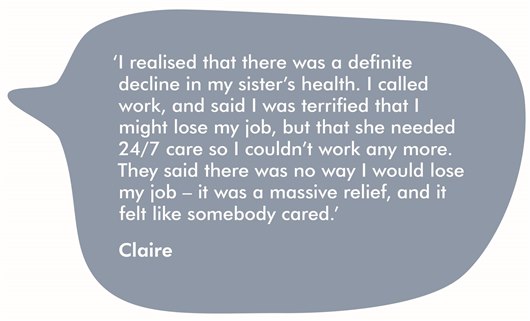If you look after someone who has cancer, your employer should try to help and support you. In this blog, written by learning and organisational development intern Kemi, we provide you with information about your rights at work as a carer.
Being a carer
Sometimes it’s hard to recognise that you are a carer. You might just think you are helping out. Understanding that you are a carer is really important in getting the support you need.
Currently, there are around 1.5 million people looking after someone living with cancer in the UK. The role of a carer can be very demanding, both physically and emotionally. As a carer, you may need practical, emotional and financial support to help you.
If you are working, you may also need support at work. There are lots of rights you are entitled to which can help take the pressure off you.
Working while caring
Around 1 in 9 people in the UK work while caring for someone with cancer. This can be difficult to juggle. But for some people, continuing working can be a positive thing.
There are carer’s assessments where you find out what support you are entitled to. This includes grants or support available in your workplace. It is worth looking into this, as you never know unless you try! Your human resources (HR) department may be able to help you.
It might be a good idea to talk to your employer or colleagues about being a carer. If people at work know about your caring responsibilities, they can support you better. You can then ask for time off or flexible working arrangements.
This is also a great opportunity to find out your company’s policy for supporting carers. Different companies offer different support. But every company can, and should, let you know where to find other sources of information.

Your legal rights as a working carer
You are entitled to certain rights that help make it easier to work while caring. These include flexible working arrangements or taking time off in an emergency. These arrangements include:
You don’t have an automatic right to flexible working, but you do have a right to ask for it. If your employer declines your request, you can appeal the decision.
Everyone has the right to take unpaid time off work to look after dependents in an emergency. This is known as ‘Time off for dependents’ and is covered by the Employment Rights Act 1996.
There are also other types of leave for carers. Some options include:
By law, you are also protected from discrimination, harassment or victimisation. We have more information about what this means on our website. We also have a booklets called Working while caring for someone with cancer and Your rights at work when you’re affected by cancer which you might find helpful.
Being a carer is demanding. It’s important to look after yourself. Do speak to your employer about how they can support you. You could also try joining one of our Online Community groups. It might help to connect with people who also have caring responsibilities.
You can share any worries or concerns and many people find them helpful.
To see what else Macmillan's cancer information team has been blogging about, please visit our blog home page! You can subscribe to receive our blogs by email or RSS too.
We're with you every step of the way
The Macmillan team is here to help. Our cancer support specialists can answer your questions, offer support, or simply listen if you need a chat. Call us free on 0808 808 00 00.
Comments? Feel free to add them below (you need to be logged in).
Keep in touch Follow Macmillan’s cancer information team on Twitter @mac_cancerinfo
Whatever cancer throws your way, we’re right there with you.
We’re here to provide physical, financial and emotional support.
© Macmillan Cancer Support 2025 © Macmillan Cancer Support, registered charity in England and Wales (261017), Scotland (SC039907) and the Isle of Man (604). Also operating in Northern Ireland. A company limited by guarantee, registered in England and Wales company number 2400969. Isle of Man company number 4694F. Registered office: 3rd Floor, Bronze Building, The Forge, 105 Sumner Street, London, SE1 9HZ. VAT no: 668265007